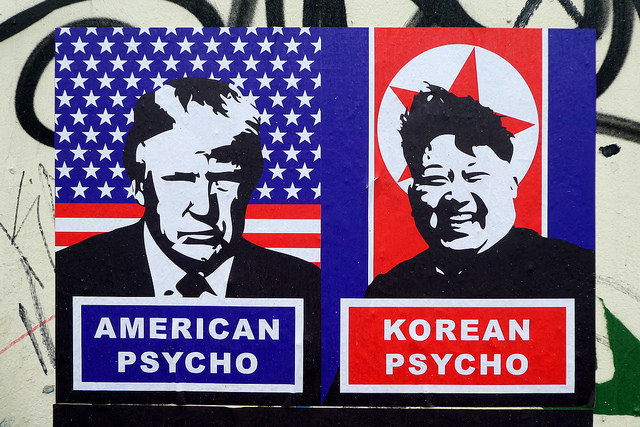One occasionally hears it said that just when you think something is foolproof they come out with a better quality of fool. Alarming as it is, this is one of those principles so universally admitted that one hardly thinks that any gentleman (or gentlewoman) would deny it.
It is all the more distressing when the fool in question resides (at least some of the year) at 1600 Pennsylvania Avenue. And yet now we find ourselves in a situation in which a man the principle features of whose resumé include empty synergy, bluster, and the creation of a fraudulent “educational” institution as one of the two main players in a potential nuclear exchange.
For those of us who came of age in the 1980s, the spectre of nuclear war was omnipresent. The broadcast of The Day After (1983), which dramatized the grim aftermath of a nuclear exchange, was a national event accompanied by an interpretive panel and a great deal of (not unjustified) hand wringing. John Badham’s WarGames, released the same year, paired the dangers of thermonuclear war with those of excessive dependency on technological control. Even the computer ultimately figured out the fundamental truth of the nuclear game: “The only way to win is not to play.”
Also in the 1980s, there was a pronounced tendency to think of Ronald Reagan as a (mostly) well-meaning clown who at least had the virtue of being willing to take direction from his handlers. Although these were, pretty much to a man, unreconstructed and wholly soulless neocons, they were also responsible political operators. They could at least be counted on to understand the stakes that we’re being played for. If they loathed the political and economic organization of their ideological opponents, they also had a sense of the gravity of the situation, and the certain knowledge that their nuclear weapons were likely to work with similar lethality to ours. In the main, they were willing to be satisfied with playing the game of tit-for-tat killing of proxies, leaving the central conflict to work itself out via more prosaic means.
And so it did. Ultimately, Soviet communism collapsed under the weight of institutional sclerosis without the need to incinerate large numbers of people. Much as there was euphoria in the immediate aftermath, the resulting multipolar system turned out to be significantly more complex than the bipolar order that preceded it. While ideological conflict seemed to ramp up the level of tension, it also channeled it. Polycephalous geopolitical competition was harder to organize, and harder to predict. Whatever the failings of the Cold War division, it at least functioned to retard the proliferation of nuclear weapons (if not completely then at least predominantly) beyond a relatively small coterie of states. Since then, the acquisition of nuclear weapons became something more in the nature of keeping up with the joneses. In this brave new world, there was premium on stade, clinical diplomacy if the thousand points of light were not to become the twinkling fires of burning rubble.
And so we come to the present day, the defining feature of which is the entwinement of the bizarre and the horrifying. Our current predicament is one of the asynchrony of historical time. On the one hand we have Kim Jong Un, epigone of nation-state Maoism, a man whose political inclinations and sartorial choices epitomize atavism in the way that Niagara epitomizes waterfalls. He is the political equivalent of someone walking around in legwarmers and a sweater cut off the shoulder, and his only really remarkable feature (either in terms of political acumen or of character more generally) is the failure to attain the extremely low bar of the standards set by his two predecessors, his father and grandfather.
On the other side we have Mr. Trump, certainly Mr. Kim’s equal in terms of paunch (if not quite so phlegmatic). Trump is the opposite end of the pendulum swing. If Kim reflects the desire of the governing strata of North Korea that things should never change, ever, the American leader is (among other less favored qualities) an expression of the desire on the part of certain segments of the US electorate that things should change fundamentally, irrespective of the consequences. It is difficult to know in this conflict between systematic and brutal repression on the one hand and nascent kleptocracy on the other for whom one should root.
Clearly the prospects of starvation are the lesser in the latter case, but there is a peculiar homology between overall political outcomes sought by the occupants of the highest segments of the income distribution in both states. It is hard to imagine that Richard Mellon Scaif or the Koch brothers would find much to oppose in row upon row of neatly dressed people sharing the unity of cheering on a beloved leader.
The calculus by which Donald Trump seems to be working his way through this crisis is not hard to parse. For some reason he seems to have thought that he would be able, by some combination of threats and cleverness, to bend North Korea’s Chinese sponsors to his will. Sadly, reality is so often the enemy and destroyer of our dreams. At his first meeting with Xi Jinping, Mr. Trump received an accounting of the actual facts on the ground (as the Chinese saw them) that should have put paid to his grandiose imaginings. But, as with some many useful things that Trump is told, the effect was only temporary and he went back to living in the fantasy world in which a major international negotiation can be blustered or back-slapped through like the pitch to build an Atlantic City casino.
At the most basic level we have here, as the Captain in Cool Hand Luke once noted, is a failure to communicate. President Trump seems to understand neither the complex history of the Korean peninsula (and the violence of the American role there) nor why it is that China might want to maintain a proxy there, even one so turbulent as the DPRK.
Through a combination of his own intellectual limitations and his propensity to listen to the lowest common denominator among his advisors (in this case probably the impressively loathsome Sebastian Gorka), Trump has managed to get himself boxed into a situation in which his own intemperate rhetoric might require the launching of a preemptive strike as some sort of face-saving measure. In sum, he may have attained the dubious distinction of being the only national leader on the world stage to get outfoxed by Kim Jong Un.
Never in all those fraught days of the 1980s did one ever imagine that the line, “the nuclear strike was ordered from the golf club” would come close to reality. But the people (or at least 23% of them) voted for change. And change they got. Say what you want about business as usual, it had the minimal virtue of not having sold the store, or leaving Guam (or Los Angeles) a smoking ruin.
True, the safety and security of the American metropole was by no means available (or healthful) for those further down the food chain. But, by the same token, threats to that security had (and have) the tendency to involve collateral threats of global import. The irony of the longest standing mass democracy, is that the fate of millions (and perhaps billions) may be ruled by people whose consciousness barely extends to the nearest county line.
Photograph courtesy of Duncan C. Published under a Creative Commons license.





